The perfect dress can make you feel beautiful for a special occasion or put your best foot forward at a work event. But dresses come in dozens of different styles, lengths, shapes, and sizes, which makes finding the right dress difficult! Check out this handy guide to different types of dresses if you want to learn how to pick the right dress for the right occasion.
Different types of dresses have variations in length, such as midi, maxi, mini, and tea-length. Other dresses have distinctive variations in shape, such as bodycon, A-line, peplum, and sheath dresses. Finally, some dresses are designed for specific occasions, such as wedding dresses and ballgowns.
In this article, you will learn about the parts and key characteristics of a dress. You will discover 50 popular types of dresses. Finally, you will find tips on how to choose the right dress for you!
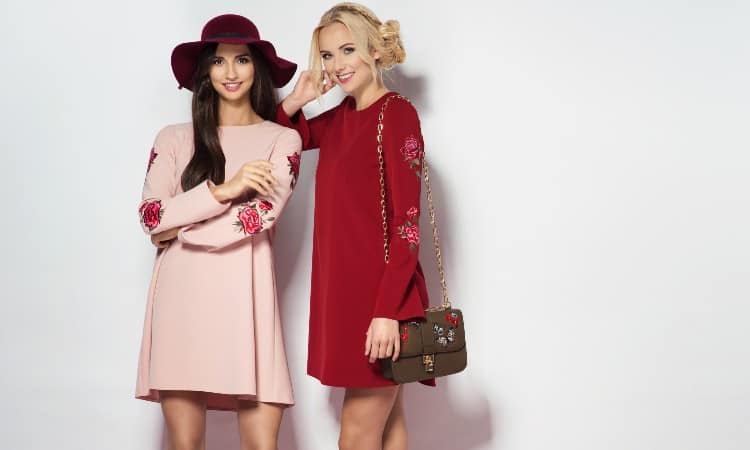
What is a Dress?
A dress is a type of one-piece garment made from a bodice and a skirt. The bodice covers the upper torso and the skirt hangs down over the legs.
Traditionally, women and girls have worn dresses in a variety of lengths and styles throughout history. Until the early 1900s, these garments often covered the entire body, reaching from the neck to the ankles.
Today, dress length and style can have thousands of different variations. Most modern dresses do share a few key parts, though:
- The bodice covers the upper torso above the waistline. It often features shaping elements such as curved seams, darts, or pleats to make the fabric fit the body’s shape.
- The skirt forms the lower portion of a dress, hanging down below the waistline. Some dresses have enormous, full-length skirts that use yards of fabric, and others feature mini skirts that barely reach the upper thigh. The lowest edge of a skirt is called the hemline.
- Many dresses have either sleeves or straps. Of course, these can also vary in style greatly, ranging from bell sleeves to spaghetti shoulder straps.
- The neckline on a dress describes the shape of the opening for the neck. It may look as simple as the crewneck collar on a t-shirt. But many dresses have necklines in more decorative styles, such as a sweetheart or Bardot neckline.
- The waistline is the area where the bodice and skirt meet. This may fall at the natural waist, but some dresses have higher or lower waistlines.
While almost every dress contains these basic parts, you can also divide different styles into types based on their formality, shape, and length variations.
One common way to classify dresses is to divide them by length. Styles like tea length, maxi dress, and midi dress all describe the length of a dress.
Another way to divide dresses into types is to separate them into formal or informal styles. Longer dresses often have a more formal appearance than shorter dresses. Certain types of fancy fabrics, such as velvet, satin, and silk, also tend to look more formal than plainer fabrics, such as cotton and jersey knit.
Finally, you can also categorize dresses into different types based on the shape of the individual dress. For example, an A-line dress has a skirt shaped like the letter A, and a mermaid dress has a skirt with a flared train shaped like a mermaid’s tail.
These distinctions create so many different types of dresses for you to choose from!
50 Different Types of Dresses
Check out this guide to 50 different types of popular dresses, listed alphabetically for your convenience.
1. A-Line

An A-line dress has a classic shape with a fitted bodice and a skirt that flares out from the waist to the knees, giving it the appearance of the letter A. Technically, the term “A-line” describes the silhouette of a dress of any kind that has a skirt with a wider hem and more tapered waist.
A-line dresses often have a more formal appearance because of the fitted bodice, making them a good choice for business casual occasions, wearing to church or party.
2. Asymmetrical/One Shoulder Dress

One-shoulder or asymmetrical dresses have one strap or sleeve, leaving one shoulder and arm bare. These dresses can come in many different lengths and have silhouettes that range from a bodycon style to a full-length mermaid.
Usually, one-shoulder dresses have a formal and sexy style best suited to sequined, silky, or velvety materials. You see this type of dress worn on the red carpet, at proms, and at black-tie events.
3. Babydoll Dress
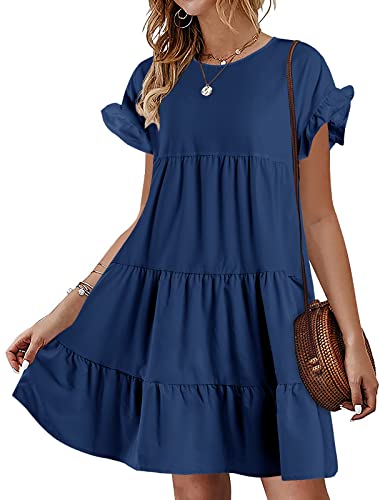
Named after a Tenessee William’s film called Babydoll, this style of dress has been around since the decline of the corset in the early 1900s. It features an empire waist and a loose skirt. Modern babydoll dresses usually either have a sleeveless bodice or puffy sleeves.
The whimsical, loose skirt descending from the high waist can give this style of dress a young and more informal appearance.
4. Ballgown

A ballgown is a type of evening wear worn to a ball, often featuring a sleeveless fitted bodice and a wide skirt. You can think of Belle’s iconic yellow dress from Disney’s Beauty and the Beast, or Cinderella’s glittery blue gown, to get the general idea of this silhouette!
There is no hard-and-fast distinction between a ballgown and evening wear. Both dresses will use fancy fabrics such as silk, chiffon, satin, velvet, or taffeta. People wear ballgowns to quinceaneras, proms, weddings, and–of course!–to balls.
5. Balloon Dress
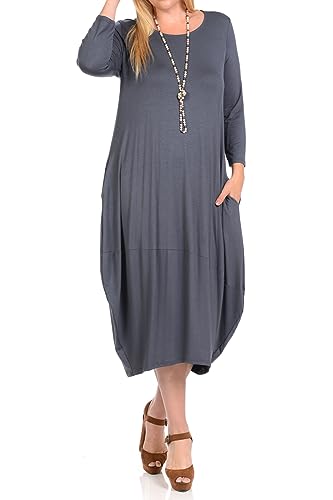
Also called a bubble dress or a balloon hem dress, this style features a unique kind of hem that flares out and then scoops back in, creating a balloon silhouette. This fashion took off in the 1950s as a popular cocktail or formal style, often paired with heels, stockings, and white gloves. Today, it remains popular for bridesmaids’ dresses and even for less formal events when it features colorful cotton prints instead of more formal satin and silk.
6. Bandage Dress

Bandage dresses have the silhouette of a tightly fitted bodycon dress but also use a distinctive knitted fabric that looks like strips of cloth wrapped horizontally around the body. This dress type has famously been called the “sexy mummy” look.
Made famous in the 1980s and 90s, the bandage dress remains one of the most form-fitting styles commonly worn in formal settings.
7. Bardot Dress
No products found.Bardot dresses have an off-the-shoulder bodice, often accompanied by a sweetheart neckline. This style gets its name from actress Brigitte Bardot who famously wore an off-the-shoulder top on screen in the 1950s.
Bardot dresses can have a more casual neckline featuring a simple oval of material worn off the shoulders and held in place by a piece of elastic. But often, a Bardot dress has a more formal appearance and a ruffled, v-neck, or sweetheart neckline.
8. Bell Sleeve Dress

As the name suggests, a bell sleeve dress has sleeves that have a flared bell-like shape. Bell sleeves can have a long or short length. They can start at the armhole and flare out all the way to the wrist, but most of the time, you see a bell sleeve with a slender fitted sleeve to the elbow and then a flared bell shape hanging from the elbow to the wrist.
9. Blazer Dress
No products found.A blazer dress features lapels and buttons that give it the overall appearance of a slightly lengthened blazer. This type of dress usually features suiting material such as wool, or lightweight khaki to mimic a trenchcoat.
Depending on the cut of the blazer dress, it can look professional and offer the perfect business casual outfit when paired with loafers or heels. Alternatively, a deep enough neckline and a short hem can turn a classic work style into something far more risque and suitable for a night out on the town!
10. Blouson Dress
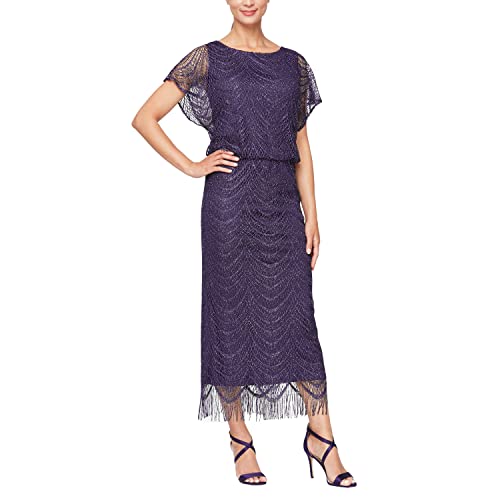
Though you may not recognize the name, you have almost certainly seen or even worn a blouson dress. This type of informal dress has a bodice that poufs out between the bust and the waist and gathers in sharply with a belt or elastic at the natural waistline. It can have a flared, gathered, or straight skirt.
The big advantage of this popular type of dress is that it looks great on many different body types, as it smooths over wide hips, flatters small waists, and drapes over the bust without drawing any undue attention.
11. BodyCon

A bodycon dress is the most form-fitting style of dress designed in the history of fashion so far. The name comes from combining the words “body” and “conscious,” as this style celebrates every dip and curve in anyone brave enough to wear it! Because of its tight figure-hugging silhouette, this dress always uses some type of stretchy material containing Lycra or elastane fibers.
You may see a bodycon dress at a formal event, but it shows up more often at proms, clubs, bars, and media events.
12. Boho Dress

A boho dress has a loose, ruffled, or flowy style reminiscent of the “flower child” styles from the 1960s. The term itself comes from the word “bohemian,” or free-spirited. Boho dresses can have knee-length or full-length skirts, poufed sleeves or no sleeves, and many variations in the overall silhouette.
They almost always feature sheer or very fine flowery fabric made from materials such as lawn, chiffon, or rayon. They also often feature deep V-necks or wrap-style bodices. Most boho dresses have ruffles somewhere on the skirt or sleeves as well.
13. Camisole Dress
No products found.A camisole or slip dress has a slender straight silhouette and spaghetti sleeve straps. It may have a v-shaped neckline as well. It almost always features silky or satiny fabric and usually ends above the knees.
You can pair a camisole dress with a blazer and boots for a walk outside in the fall, or wear the dress with bare arms and a pair of heels for a night out on the town.
14. Cocktail Dress

A cocktail dress can come in many shapes and styles but is always suitable for a semi-formal afternoon event. Most cocktail dresses have knee-length skirts, as a shorter length is one of the distinctions between most semi-formal and formal dresses.
Traditionally, this type of dress originated for wealthy people who changed attire for a pre-dinner cocktail hour and then again for a more formal evening event or dance! By the 1950s, cocktail dresses became popular for work or private parties centered around dancing and drinking cocktails. Today, you might wear a cocktail dress to an afternoon wedding, a party at the office, or even out to a club!
15. Corset Dress

A corset dress is any style that features a corset-like lacing up the front or back of the bodice. Sometimes, a corset dress could also mean a dress with a boned corset-style bodice and a fluffy tutu-style skirt.
16. Denim Dress

A denim dress contains denim fabric and has a casual, informal appearance. This type of dress had a surge in popularity in the 1980s and brings to mind giant hair and heavy makeup. Today, these dresses use more lightweight denim than jeans and can range in style from a “mom-like” long-sleeved number with a gathered waist to stylish, sleeveless jumpers.
17. Drop-Waist Dress

A drop-waist dress has a waistline that rests at the hips rather than at the natural waist. This style of dress had its heyday way back in the 1800s (think of Samantha, the iconic Edwardian-era American Girl doll), but it has a lingering popularity today. This dress has a loose, boxy fit from the shoulders to the hips and then a pleated or flared skirt that often ends at the knee.
18. Empire Waist Dress

An empire waist dress has a close-fitted and often low-cut bodice and a waist that falls just below the bust, considerably above the natural waistline. The dresses in Jane Austen movies or the Bridgerton TV show use this type of waistline.
Why is it called an “empire waist” dress? It became popular during the Napoleonic wars and got its name from Napoleon’s wife, Empress Josephine, who made the new style quite trendy at the time!
19. Halter Dress
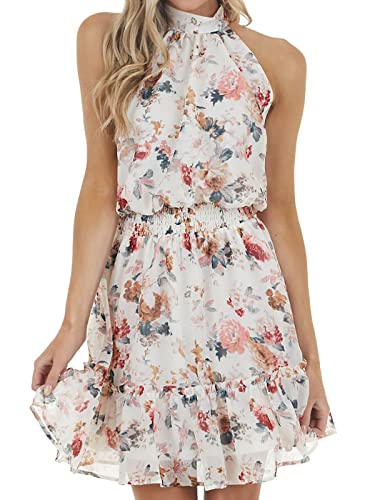
A halter dress has straps that loop around the back of the neck, either in ties or as one stretchy loop to slide over the head. This type of dress has no sleeves and almost always has an informal vibe. You often see it made out of stretchy knit fabrics.
20. Handkerchief Dress

A handkerchief dress has an uneven hem with triangles of fabric edging it and a skirt is created from squares of material that look like handkerchiefs. More commonly, in modern times, the fabric just uses a printed design that mimics a floral or handkerchief image.
21. High-Low Dress

A high-low dress has a hem that dips lower in the back than it does in the front. A curved or ruffled hem often makes this asymmetrical height even more apparent.
22. Kaftan Dress

A Kaftan dress has a long, loose, full-length shape and loose, flowing sleeves. The style stems from Middle Eastern and traditional Persian robes and often features brocade, cotton in geometric patterns, or sheer fabrics.
23. Kimono Dress

A kimono dress preserves some of the stylistic essences of a traditional Japanese kimono but also presents a more casual, modern vibe. Kimono-style dresses have a V-neck neckline, a wrapped bodice, and a loose, flowing skirt. They often feature silky or sheer printed fabrics and have wide sleeves that drape at the elbow or all the way to the wrist.
In contrast to an authentic kimono, a kimono-style dress usually does not open all the way down the front.
24. Maxi Dress
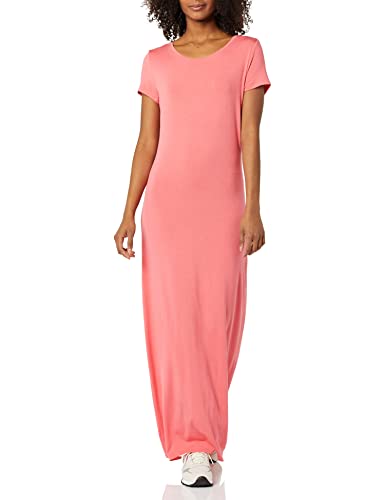
A maxi dress has an informal style with a high waist, a narrow silhouette, and a long skirt that ends at the ankle or on the floor. The most popular type of maxi dress usually features spaghetti straps and soft knitted cotton, but you can also find maxi dresses made from printed sheer fabric.
The term “maxi dress” originally meant a long dress, as opposed to “midi dress,” which meant a dress ending below the knees. In the past few decades, it has come to mean a beach-type dress with a narrow but flowing skirt, a form-fitting bust, and a high gathered waist.
25. Mermaid Dress
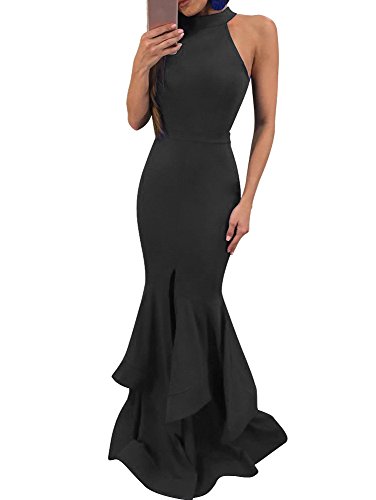
A mermaid dress has a fitted body and a floor-length skirt with a distinctive flare at or below the knee, giving it the appearance of a mermaid tail. The fabric used in the flared skirt usually includes lace, beads, sequins, or other sparkly bits to highlight the unique shape.
This style often appears in wedding dresses or fancy formal evening wear.
26. Midi Dress

A midi dress means any dress with a hem that ends between the knee and the ankle. Most often, the hem will fall midway down the calf. Longer skirts usually indicate greater formality in women’s clothing, so a midi dress often has a semi-formal appearance suitable for wearing to a religious service or a family party.
Because of the length of the skirt, midi dresses often look best on tall women rather than on someone with a petite frame.
27. Mini Dress

The term mini dress describes any dress with a skirt that ends above the knee. Most mini dresses end mid-thigh, but some have skirts that barely reach the top of the thigh. Popular dress styles that come in a mini dress length include bodycon dresses and shift dresses.
28. Off the Shoulder

An off-the-shoulder dress typically has a wide, loose neckline drapes loosely to expose one shoulder. This style can also mean a Bardot-style neckline with a gathered circle neckline that sits just below both shoulders or even a strapless dress with a fitted bust.
29. Pinafore Dress

A pinafore dress or jumper has a sleeveless apron-type style and is worn over a blouse or shirt. Pinafore style dresses can have many stylistic differences, ranging from ruffled shoulder straps to a crossover apron-style that looks like a sleeveless wrap dress.
They can also contain all kinds of different fabrics, from the corduroy pinafore dresses made popular in the 60s to the ruffled gingham or chintz of today’s farmhouse look.
30. Pencil Dress

A pencil dress has a narrow, straight skirt and a form-fitting bodice. Christain Dior first made this cut famous and actresses like Marilyn Monroe helped to promote its classic style. Today, a pencil dress can have many different styles of form-fitting bodices, but it always has a narrow, straight skirt that ends somewhere above the knee.
This type of dress works best for business casual outfits at the office, though some variations on the style can look more formal.
31. Peplum Dress

A peplum dress has a flared ruffle extending from the waistline, separate from the material of the skirt. The ruffle could have a gathered or bais-cut drape, or it may have folded pleats to give it shape instead.
This style highlights the waist but obscures the stomach, making it an excellent choice for people with many different body types.
32. Pouf Dress

A pouf dress has a puffy skirt with a hem that curves back in at the bottom edge, creating a bell-like or “pouf” shape. The term “pouf” probably originated as another name for an ottoman or rounded footstool.
This style has many similarities to a balloon dress but often has a more narrow silhouette and a shorter length.
33. Princess Dress
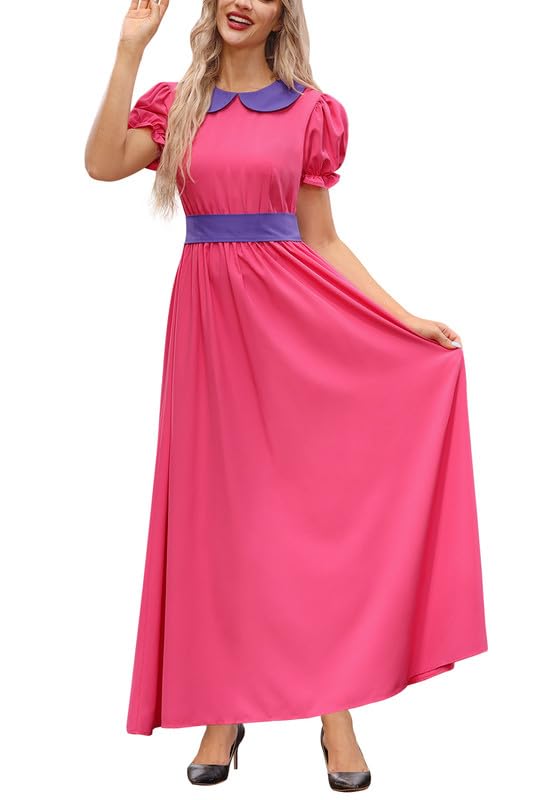
While you may instantly visualize Cinderella or Sleeping Beauty, a princess dress means a dress that does not have horizontal seams or a sewn waistline. Instead, it has fitted vertical panels that shape the dress to the body in long curved seams all the way from the neckline to the hemline.
Created by Worth and named after Princess Alexandra in the 1800s, this style remains a popular choice for modern dresses, especially wedding dresses and evening wear.
34. Qipao Dress

A qipao or cheongsam has its roots in traditional Chinese women’s clothing. This elegant, narrow dress usually features colorful embroidered brocades or silks. It has a high mandarin style collar and often has a slit running up the side of the skirt to the knee.
35. Sari

A sari or saree is a long rectangular strip of fabric worn over the shoulder on top of a fitted bodice called a choli. This style of dress has roots in India and remains popular in daily and formal wear. The kind of saree often depends on the type of silk used in it, though people from different cultural backgrounds may also drape the sari in distinctive styles.
36. Sheath Dress

A sheath dress has a narrow, straight silhouette that ends above the knee. It usually has no sleeves and uses darts in both the bodice and the upper portion of the skirt to fit the dress close to the torso.
This type of dress can look formal when made of fancy fabric like satin, and can also serve as business casual wear when worn with a blazer and heels.
37. Shift Dress
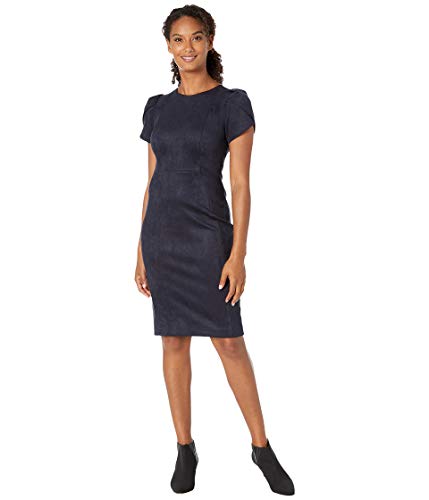
The shift dress developed from the loose, straight cut of flapper dresses in the 1920s. This dress style has straight-cut sides and darts at the bust to provide a little shaping. Unlike a sheath dress, it doesn’t have shaping darts or tucks at the waistline.
The loose, somewhat boxy cut makes this shape of dress great for hiding curves as the dress is not worn with a belt.
38. Shirt Dress
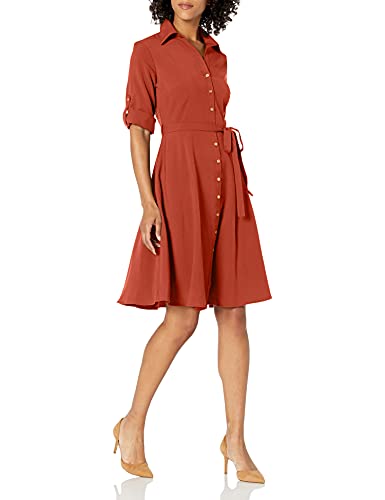
A shirt dress looks a lot like a button-down dress shirt, with cuffs, a fold-over collar, and buttons marching down its front. Modern shirt dresses may feature fabrics like flannel, denim, or more formal wool or linen.
Most of the time, shirt dresses look very casual and often end above the knee. They look great when paired with a belt, sweater, and boots in the fall.
39. Skater Dress
No products found.A skater dress is a subset of the A-line dress type with a shorter skirt. It can have long sleeves in traditional figure-skating style or even come in a looser, sleeveless style perfect for rollerblading.
Made popular by famous figure skaters such as Dorothy Hamill, this type of dress can look classy or fun and low-key, depending on the type of fabric used.
40. Slip Dress

A slip dress looks like (surprise!) a slip, that classic slinky undergarment sometimes worn beneath a dress. A slip dress almost always features silk or satin cut on the bias so that it drapes and fits the body’s shape. This dress usually has a narrow silhouette, no waist seam, and spaghetti straps at the shoulders.
41. Smock Dress
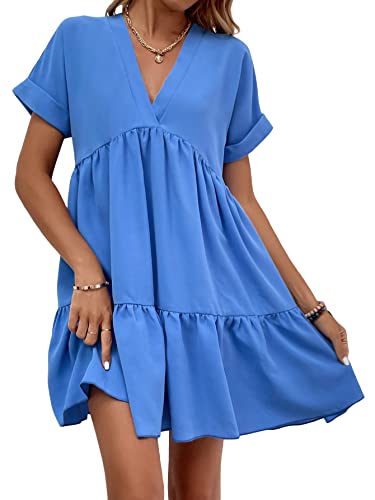
A smock dress has full sleeves and a bodice gathered up with a special type of stitching called smocking. Smocking uses a honeycomb pattern of stitches to draw the fabric into tiny hexagonal gathers. This ancient clothing style remains popular for its loose, comfortable fit and fun detail.
42. Strapless Dress

A strapless dress has no fabric over the shoulders and upper arms. Many dresses can come in a strapless style, including ballgowns, bodycon dresses, and wedding gowns.
One key feature of all strapless dresses is that they have a form-fitted bodice, often supported with boning or lining, to help hold the bust in place.
43. Sun Dress
No products found.A sundress uses light, breathable fabric and a loose cut to create an outfit perfect for a hot day. Sundresses come in many different styles but often have ruffled, knee-length skirts and V-neck or scooped necklines.
44. Sweater Dress

A sweater dress is exactly what it sounds like–a dress made of knitted yarn that looks like an overlong sweater! In the simplest terms, you can think of this as any dress containing knitted or crotched fabric.
Sweater dresses often have loose, straight side seams that fall just above the knee, pairing well with fall boots and leggings.
45. Swing Dress

A swing dress has the silhouette of an A-line style but a much more full skirt cut out of a full circle of fabric. This style became extremely popular in the 1950s following the fabric shortages of WWII, and it remains in style today with the “rockabilly” style crowd and with some cocktail and wedding dress styles.
46. T-Shirt Dress
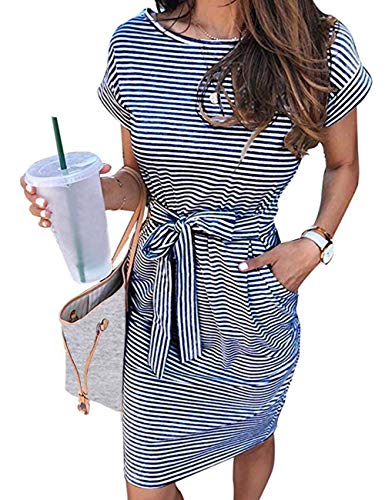
A t-shirt dress takes the concept of a soft, stretchy, boxy shirt and stretches it just a bit longer to turn it into a dress. T-shirt dresses always look like oversize or overlong tees, made out of jersey knit fabric.
This ultra-casual style offers cool comfort as you work around the home or a laid-back vibe as you hang out with friends.
47. Tea-Length Dress

A tea-length dress has a hemline that ends near the ankle. Not quite as formal as a full-length gown, this type of dress was traditionally worn to afternoon tea. Today, it often has a semi-formal style suitable for afternoon weddings. You would not often wear a tea-length dress to the office in this day and age.
48. Tube Dress

Like a tube top, a tube dress is made out of one big loop of stretchy fabric, often lycra or a jersey knit. This kind of dress often looks less fancy than a bodycon dress, but it will look just as form-fitting! A tube dress is strapless and often quite short, with a hemline ending well above the knee in most cases.
49. Wrap Dress

A wrap dress has an open front, like a robe, and a belt that allows you to wrap it shut and secure it around you. In some cases, the wrap dress does not open in the front–it just has a sewn-together bodice that looks as if it opens. This style typically features stretchy knit fabric.
50. Wedding Dress
No products found.Traditional Western wedding dresses come in many styles, but these extremely formal gowns use fancy white cloth such as satin, tulle, silk, or brocade. They often feature elaborate detail like lacework, beading, sequins, or embroidery.
Wedding dresses sometimes have elements that most modern dresses no longer use, such as a train that hangs down onto the floor behind you. Of course, the other thing that differentiates this type of dress is that it is only worn by brides at weddings.
What Type of Dresses is Trending Now?
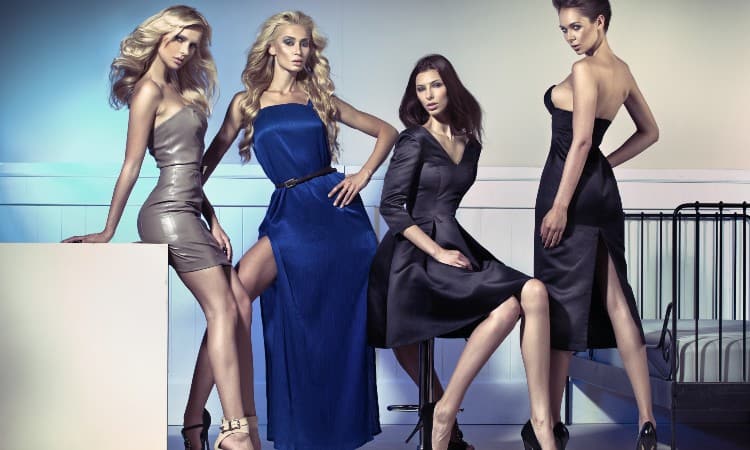
The current top-trending dress fashions include bright monochrome fabrics, bold stripes, and flowy boho outlines. Momentary trends that may or may not last include dresses with cutouts at the shoulders, the navel, or above the hem.
That said, as you have seen from the 50 different styles of dresses described above, most dress styles have a classic appeal that remains in fashion from year to year. A classic “little black dress” or pencil skirt number never goes out of style!
What Dress Should You Wear?
You should pick a dress to wear based on both the occasion and your body type. The occasion often determines whether you should pick a formal or casual style. For example, you might wear a pencil dress to the office, but probably not to the beach!
Picking the right dress for your body type also matters, though.
- For an apple-shaped body, try wearing any style with a deep V-neck. Short skirts that show off your legs work, too! Dresses with A-line skirts or high empire waists will look good on you.
- For hourglass-shaped bodies, try wearing any style with a sharply defined waist, such as an A-line, bodycon, or blouson dress.
- For a pear-shaped body, highlight the shoulders and bodice and avoid drawing attention to the skirt. You may want to try dresses with deep necklines, such as scoop or V-necks.
Conclusion
You can find a perfect dress for every occasion once you learn about all the different types of dresses! One way to classify dresses is to divide them into formal and informal categories, such as wedding and maxi dresses. You can also divide dresses by length: for example, A-line dresses often end at the knee, and tea-length dresses fall to the ankle.
Finally, you can also classify types of dress based on unique shapes and features. Smocked dresses use special smocking to gather up tiny puckers in the bodice of the garment, while princess dresses have no waist seam and empire-waist dresses have a high waistline that falls just below the bust.